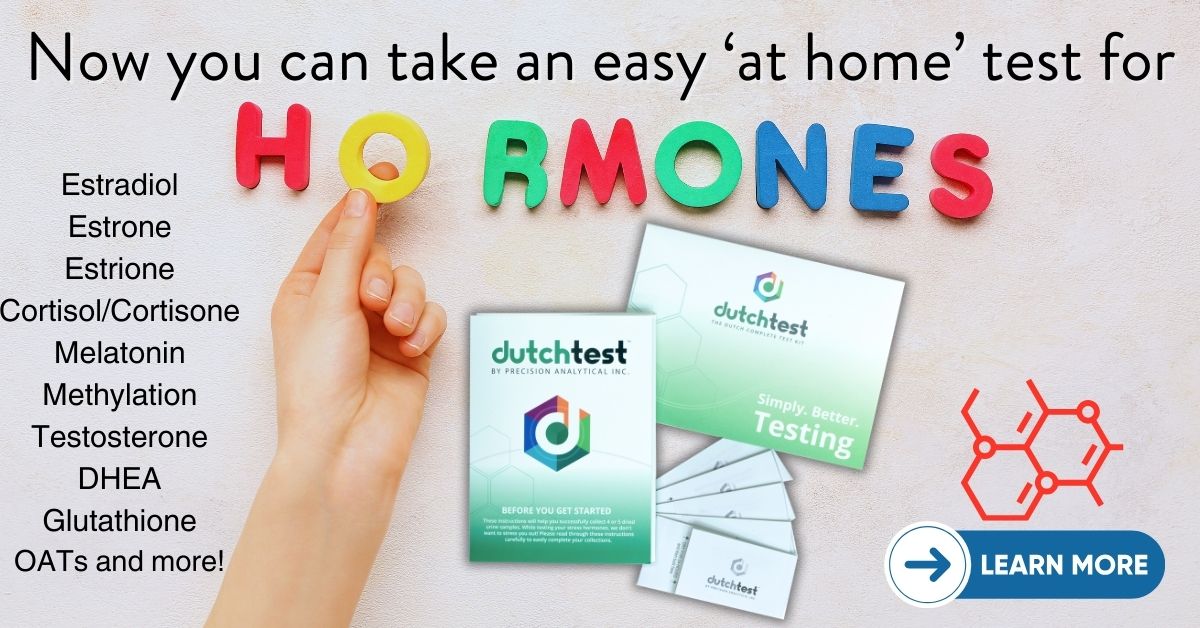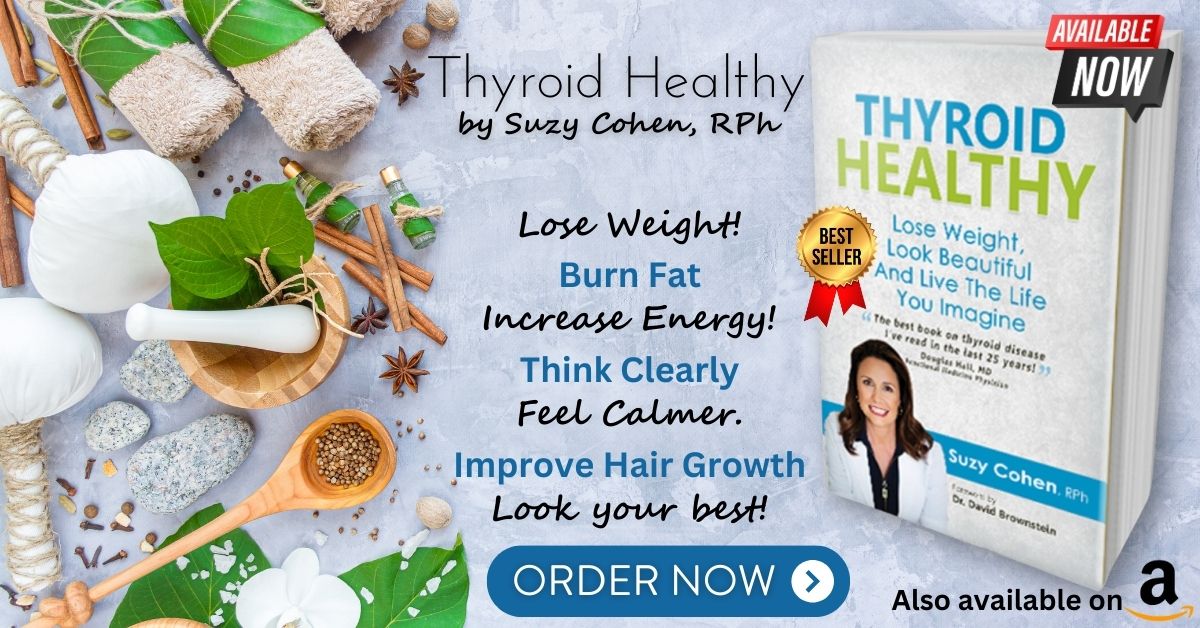What's On This Page?
ToggleUnexplained fatigue, hair that is falling out quickly, feeling cold and the concern that you’re losing your mind! These are pretty hallmark symptoms of hypothyroidism, which goes undiagnosed due to poor standards for testing.
The fatigue, hair loss, thermal dysregulation and brain fog are very common but not exclusive to this condition. But low thyroid hormone (hypothyridism) isn’t the only thing that can go wrong with this butterfly-shaped gland. You could have a growth on it called a nodule, you could have high levels of hormone being secreted from it (termed hyperthyroidism), and there could be an autoimmune attack against it too! Plus more. Today, I will cover a few different myths versus facts because you need to know the differences, and be as informed as you can be.
A lot of people aren’t interested in this gland, and that’s okay. It isn’t usually a topic of interest until a person is diagnosed with the condition via a lab test. But some of those lab tests are outdated, and you could very well have this condition, without even realizing. That’s why I often list the symptoms for people. It’s just so you can evaluate your own symptoms to see if you think you have it. Because if you think you have hypo, or hyperthyroidism, you can delve deeper into testing and find out for sure.
There are few things worse than a misdiagnosis. It’s a fact that people get diagnosed with depression when they really have hypothyroidism.
I want to show you that it’s NOT necessary to wait until a diagnosis is upon you. It’s possible that you can notice the hallmark symptoms yourself, and get help before it becomes too serious.
I wrote an extensive article that you can read later, it’s called Thyroid 101, Understandings Basics of Hypothyroidism and Autoimmune Thyroid Illness.
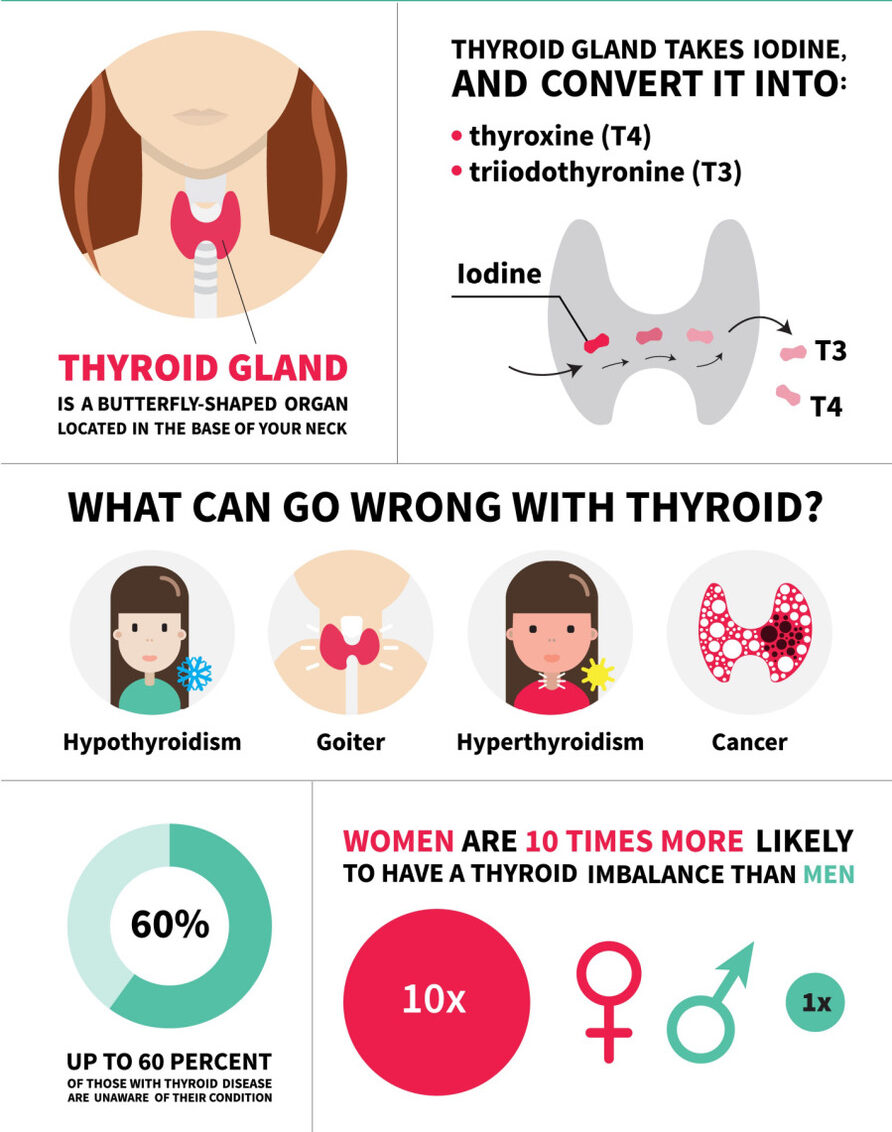
Separating Thyroid Myths from Facts
Myth: You need physician to find out if you have thyroid illness.
Fact: No, you can self-order blood tests today and ask for a Thyroid Profile. If you didn’t realize you could self order your own blood test nowadays, READ THIS ARTICLE I wrote which will help you find a lab. This is a very basic test that all labs offer today. You may do that test, along with other specialized blood test such as TPO antibodies.
You do need a physician for proper treatment and help. This is not something you can self treat. I have written a book to help people, and it is available HERE.
Another Myth: A natural approach using a diet can manage hypothyroidism, or hyperthyroidism.
Fact: No, this alone will not cure anyone. Hypothyroidism requires natural or conventional medication, or a little bit of both! The two common meds used for this include Natural Desiccated Thyroid (NDT) or levothyroxine.
You will need to a physician to get a prescription for medication, and to receive proper treatment.
Women’s Health and Thyroid Disease
Myth: Only women get thyroid disease.
Fact: False, men get it too, in fact men sometimes have nodules and cysts on their thyroid gland, along with under-the-radar symptoms. What is true is that mostly women deal with it, but again guys are not immune.
Myth: Issues with the ‘butterfly gland’ will not affect fertility.
Fact: False, issues with this gland make it harder to become pregnant, and increase the risk for miscarriage. Something of interest to you is with plastic bottles… I wrote an article that discusses the link between a chemical that leads to hypothyroidism, which then increases the risk of infertility and miscarriage. It’s called, Perchlorates Can Cause Hypothyroidism.
Myth: You can’t eat cauliflower, broccoli or Brussels sprouts if you have thyroid disease because it can enhance goiter formation.
Fact: This is not entirely true. It’s the raw consumption that has a small potentially negative impact, but you’d have to eat a lot! If you cook your vegetables, you can eat them with no problem and they are very healthy.
The problem is when people juice a lot of crucifers, or they take those green powdered superfood supplements that are loaded with goitrogens, then it is a problem. If you are trying to make sense of what I just said, CLICK HERE to read an article that I wrote about the goitrogenic effects of certain foods. It’s called The Case Against Kale.
You may also learn something new regarding this topic in my new article: Be Aware Of Thyroid Risks: 6 Goitrogenic Medications To Understand.
Lumps on an Ultrasound
Myth: Lumps or nodules found on an ultrasound scan mean a tumor.
Fact: No, most nodules are benign and only a small percentage (perhaps two to five percent) are dangerous. If further testing and scanning is required, or a biopsy, your endocrinologist can direct you. By the way, some nodules are associated with an autoimmune thyroid condition called Graves’ disease. I invite you to use my search box above to find articles on this condition, or any other condition you have. I have many articles archived at this website!
If you have a fine needle aspiration (FNA) scheduled, or they have found a nodule, read my article about that: Beyond The Biopsy: Revolutionizing Thyroid Nodule Evaluation.
I also wrote this article entitled, The Secret Nutrient that Helps Graves’ Disease.
Is TSH the BEST Way to Evaluate Thyroid Status in a Person?
The image below that I created visually explains the conversion process of the thyroid hormone T4 (thyroxine), which is secreted by your gland, into 2 different hormones: T3 (triiodothyronine) and rT3 (reverse T3).
T3 is the active form that influences various physiological processes, while rT3 is inactive and does not have the same effects as T3. We do need both of these because T3 is akin to a gas pedal, whereas rT3 is like the brakes in a car. You wouldn’t want the gas pedal jammed because you’d be driving way to fast and would crash, right. So a little rT3 is okay. I am making my way to negating a common myth and common test (that TSH is the way to monitor a patient on medicine).
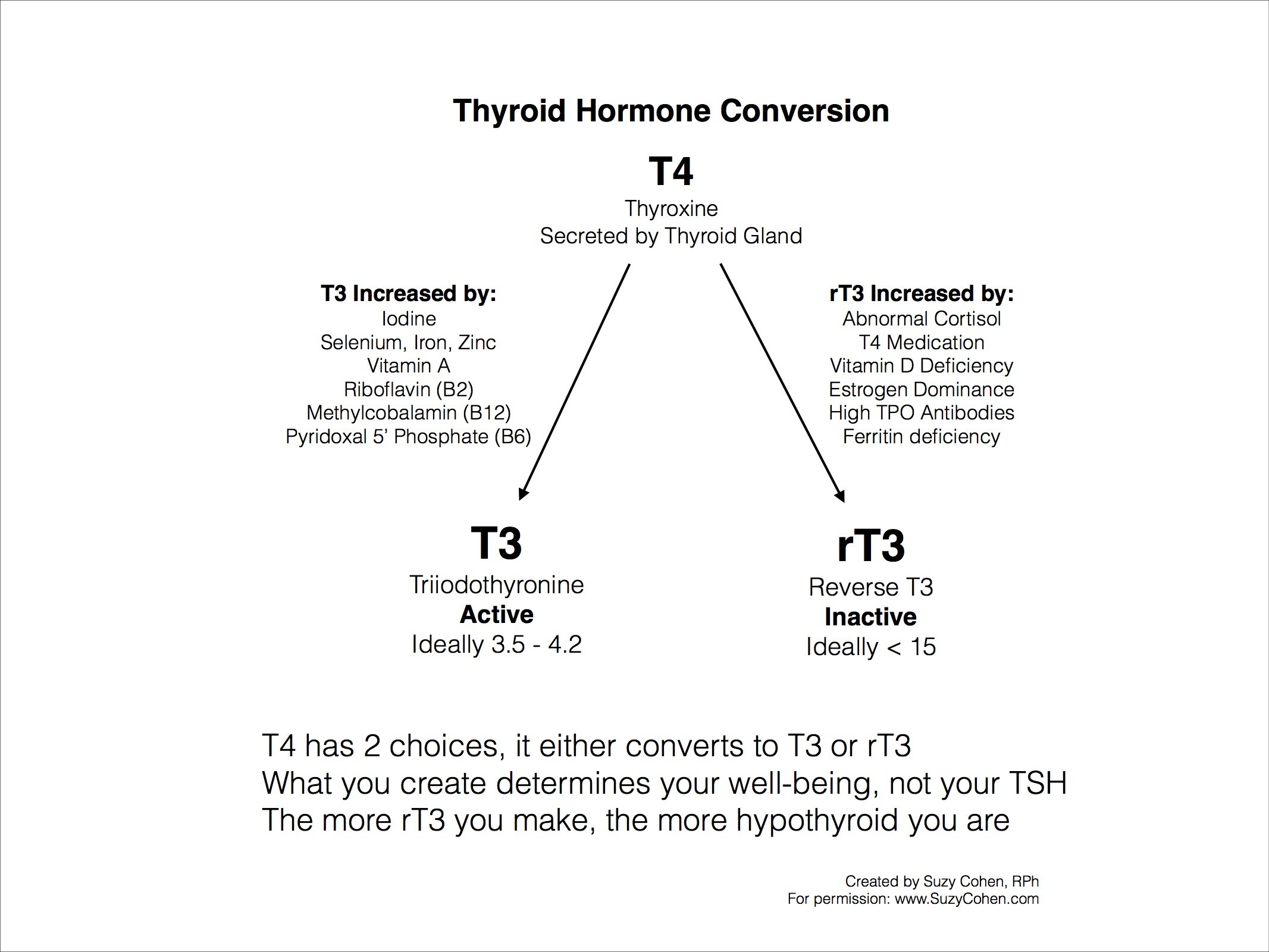
T3 Increase Factors: My picture shows that the conversion of T4 to T3 can be increased by several nutrients:
- Iodine
- Selenium
- Iron
- Zinc
- Vitamin A
- Riboflavin (B2)
- Methylcobalamin (B12)
- Pyridoxal 5’ Phosphate (B6)
Factors that Increase rT3
rT3 Increase Factors: The conversion to rT3 can be increased by different factors and TOO much of it can make you hypothyroid, balance is critical. Be aware of what increases this ‘inactive’ form of thyroid hormone.
- Abnormal Cortisol Levels
- T4 Medication
- Vitamin D Deficiency
- Estrogen Dominance
- High TPO Antibodies (which are often associated with autoimmune thyroid disease)
- Ferritin deficiency
Ideal Levels: My graphic also indicates that ideally, the T3 level should be between 3.5 – 4.2, and the rT3 level should ideally be less than 15.
Decision Path of T4: T4 has two pathways – it can convert to either T3 or rT3. The choice between these conversions has a significant impact on a person’s well-being. An important point made is that the production of rT3 is an indication of hypothyroid status, as more rT3 suggests less of the active T3 is being produced.
Myth: Thyroid status and medication dose should be determined by TSH levels.
Fact: While TSH levels are important as part of screening a person, the well-being of someone with thyroid issues is more significantly influenced by the balance and the conversion of T4 into T3 and rT3. The right levels of active T3 are crucial, and an increase in rT3 indicates a shift towards hypothyroidism, regardless of TSH levels.
This reflects the complexity of thyroid function and the importance of looking beyond just one indicator (like TSH) to fully understand thyroid health. Let’s keep going with some other myths!
Myth: If you’ve been taking a medication and it has stopped working, that means you are getting worse.
Fact: False, if you are taking a medication and you no longer respond, it could simply mean that you need a different dosage, or you need some adrenal support.
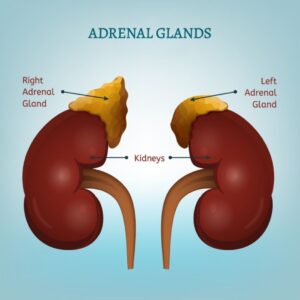
The thyroid gland and the adrenal glands work together. Sometimes you can raise your T4 (thyroxine) medication dose and still not feel well. In this case it may possibly be a sign that you need natural herbal supplements to support adrenal health. Ashwagandha is a great one (maybe not for every single person, but for many).
That’s why I put KSM-66 brand of this herb into my Thyroid Script® Adrenal Caps, available at my vitamin shop. You don’t have to shop with me, I want you to buy what you feel is right for you, I just want you to know it’s available as many of my readers don’t realize I have a line of thyroid-nourishing formulas including Yummy Greens, HashiScript, Joint Script and various face creams intended to soothe dry, sensitive skin.
The pint is, once that see-saw is balanced, your medication should begin to work. If you have been stressed for a very long time, you may benefit more from a “desiccated” pill than levothyroxine which is T4. The T4 doesn’t convert very well to active hormone. You may also benefit from adaptagens and/or possibly DHEA.
All of this should be worked out with your doctor. If you want an at-home urine test to find out your levels of DHEA, estrogen, testosterone, cortisol, cortisone and more, learn about the DUTCH Complete test. See below.
Resources That Will Help
I hosted a worldwide Thyroid Summit and interviewed many doctors and experts on the condition. I have a flash drive AVAILABLE HERE with all of the impressive interviews. I also am the author of a best-selling book called Thyroid Healthy available at my site and on Amazon.

Suzy Cohen, has been a licensed pharmacist for over 30 years and believes the best approach to chronic illness is a combination of natural medicine and conventional. She founded her own dietary supplement company specializing in custom-formulas, some of which have patents. With a special focus on functional medicine, thyroid health and drug nutrient depletion, Suzy is the author of several related books including Thyroid Healthy, Drug Muggers, Diabetes Without Drugs, and a nationally syndicated column.

